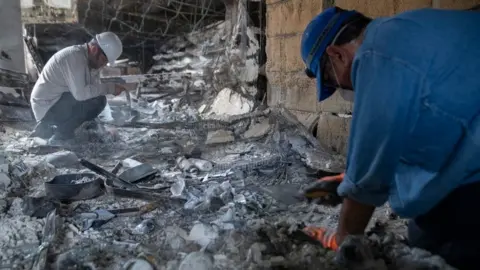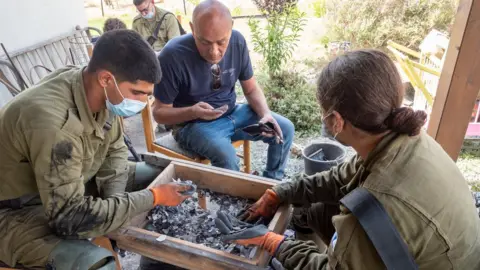Israeli archaeologists help find remains of Hamas attack victims
 Shai Halevi/Israel Antiquities Authority
Shai Halevi/Israel Antiquities AuthorityArchaeologists have been enlisted to help Israel's military identify the remains of some of the 1,400 people killed in Hamas's attack a month ago.
They have been combing through and sieving the ash from burnt houses in which families from Kibbutz Be'eri, Kfar Aza and Nir Oz were murdered, the Israel Antiquities Authority says.
They have also been checking burnt cars at a festival site where hundreds died.
The IAA says the remains of at least 10 missing people have so far been found.
Some of them have since been buried, while other evidence has been brought for further examination at the Shura military base in central Israel.

More on Israel-Gaza war
- Follow live: Latest updates
- From Israel: Pain still raw a month after Hamas attacks
- Watch: The devastating effects of war on Gaza's children
- Explained: Who are the hostages taken by Hamas from Israel?

On 7 October, an estimated 1,500 Hamas gunmen breached the Gaza perimeter fence under a barrage of rockets and then systematically attacked anyone they came across at nearby southern Israeli communities and military posts, as well as the outdoor Supernova music festival.
The UN says the names of 1,159 Israelis and foreign nationals who were killed, including 828 civilians, have so far been released by Israeli authorities. Of those whose ages have been provided, 31 were children.
Another 242 people, including about 30 children, were taken hostage.
 Assaf Peretz/Israel Antiquities Authority
Assaf Peretz/Israel Antiquities AuthorityThe Israel Antiquities Authority said in a statement on Tuesday that its archaeologists had been asked by Colonel Yossi Cohen of the Israeli military's Gaza Division two weeks ago to help search for missing people in houses and cars that were incinerated in the attack.
"The archaeological methods employed at ancient sites are similar to the methods applied here," it cited the archaeologists as saying.
"But it is one thing to expose 2,000-year-old destruction remains, and quite another thing - heart-rending and unfathomable - to carry out the present task searching for evidence of our sisters and brothers in the settlements."
A video posted online by the IAA showed a team of archaeologists and soldiers inside several destroyed houses in Kibbutz Be'eri.
They are seen carefully inspecting ash and other charred debris on the floor with trowels and removing personal items from a sieve.
"I believe and hope that we found the missing father," one of archaeologists is heard saying.
"In the same house, we found several bodies of terrorists together with their weapons," he adds. "There was a lot of blood, shocking things that shouldn't be described here."
Another archaeologist vows: "We will continue until we get to the last burnt house and we know that we have found everyone we possibly can."
